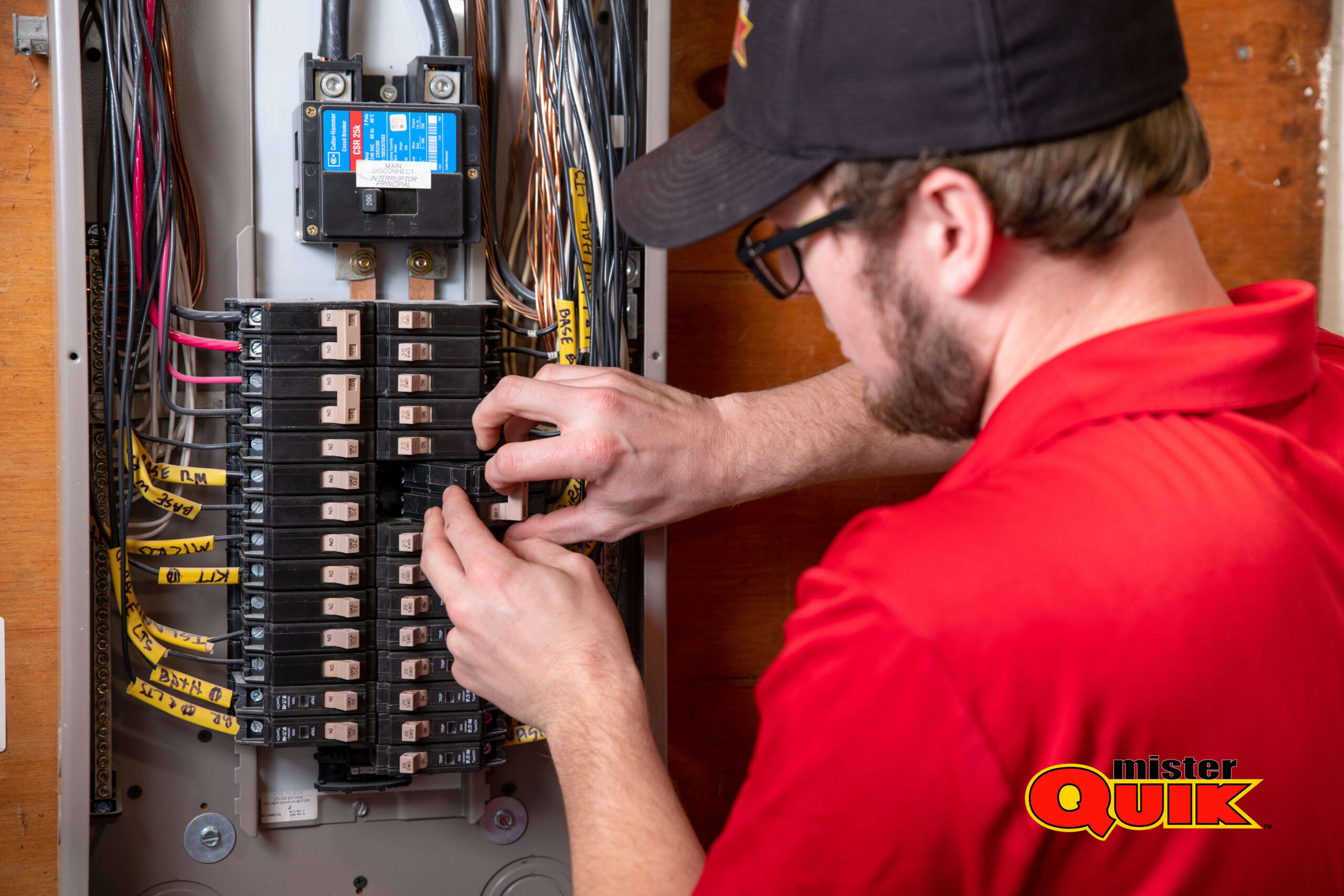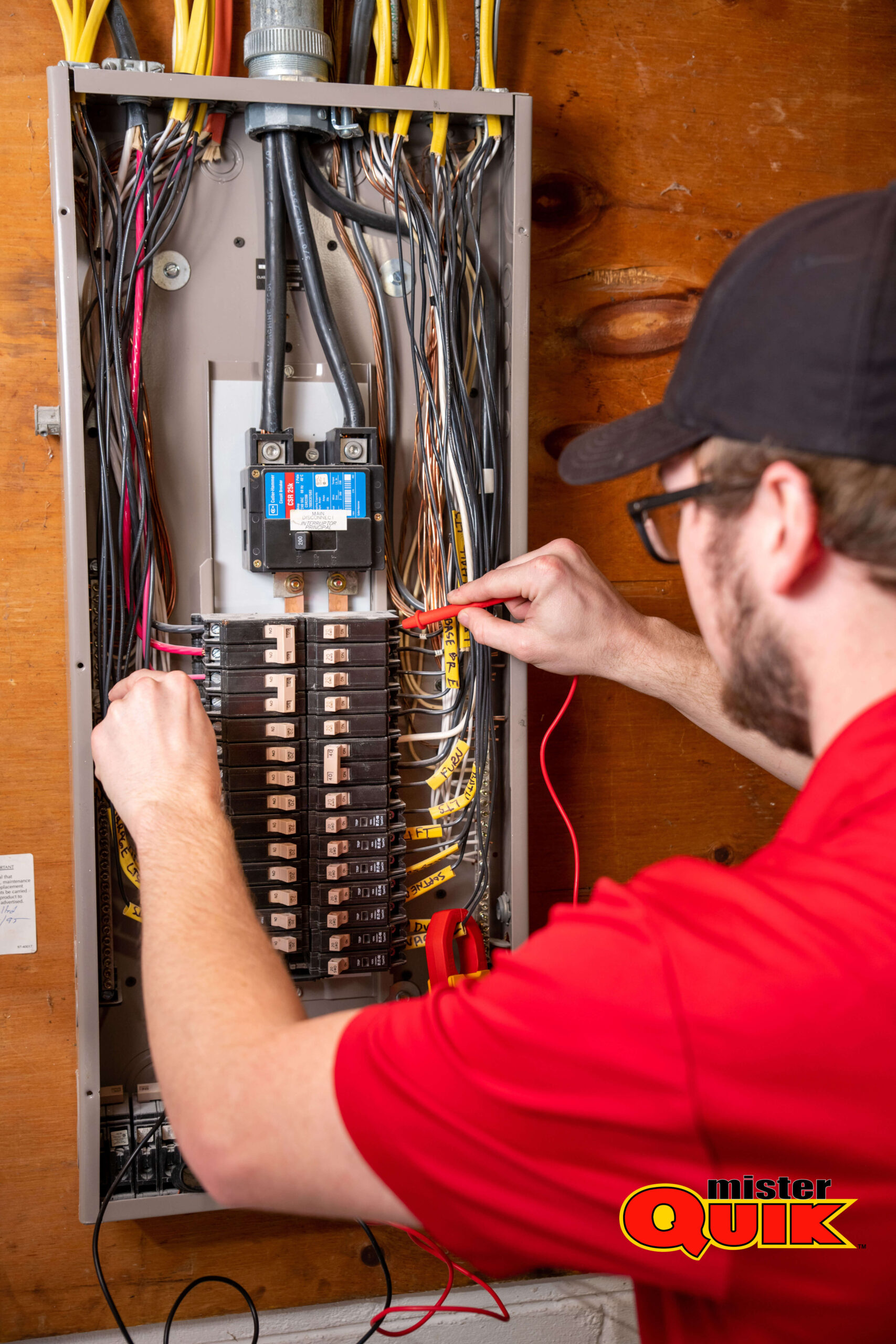Fishers Circuit Breaker Installation

Breaker Installation
Flickering lights? Dead outlets? Strange burning smells? These could all be signs of a faulty circuit breaker. Circuit breakers are the little heroes of your electrical system, automatically shutting off power when a circuit gets overloaded. But sometimes, even heroes need a helping hand!
If you’re facing electrical issues and suspect your circuit breakers need attention, don’t wait! Ignoring electrical problems can be dangerous and lead to bigger issues down the line. Here’s why getting professional Fishers circuit breaker installation is the right call:
- Safety First: Electricity is no joke! Messing with your breaker box yourself can be dangerous, especially if you’re not familiar with electrical wiring. Trained electricians have the knowledge and experience to handle your breaker box safely and efficiently.
- Fast Fixes: Electrical problems can be a major inconvenience. A qualified electrician can quickly diagnose the issue and get your breakers back up and running in no time.
- Long-Term Solutions: Not all electrical problems are obvious. A professional electrician can not only fix your immediate breaker issue but also identify any underlying problems in your electrical system to prevent future headaches.
- Peace of Mind: There’s no better feeling than knowing your home’s electrical system is safe and sound. When you hire a licensed electrician from Mister Quik for circuit breaker installation, you can rest easy knowing the job is done right.
Here are some signs that your circuit breaker might need attention:
- Tripping Frequently: If your breakers are tripping all the time, it’s a sign they’re overloaded or malfunctioning.
- Burning Smell: A burning odor coming from your breaker box is a serious red flag and could indicate overheating wires or a failing breaker.
- Sparks: Seeing sparks when you turn on a switch or appliance is a danger sign and could be caused by a loose connection or faulty breaker.
- Dimming or Flickering Lights: Lights that dim or flicker can be a sign of a loose connection or an overloaded circuit.
If you’re experiencing any of these issues, don’t hesitate! Contact a licensed electrician at Mister Quik Home Services to get your electrical system back in tip-top shape.
Types of Circuit Breakers
Are you facing issues with your electrical system and considering Fishers circuit breaker installation? Understanding the types of circuit breakers can help you make informed decisions about your electrical needs. Here’s a simplified guide to different types of circuit breakers:
Found in most residential and commercial buildings. Designed to protect against overload and short circuits. Available in various sizes and amperages to suit different applications.
Specifically designed to prevent electrical shock. Detects imbalances in electrical currents and quickly shuts off power to prevent accidents. Ideal for areas prone to moisture such as kitchens, bathrooms, and outdoor outlets.
Detects dangerous arc faults caused by damaged wiring or malfunctioning appliances. Helps prevent electrical fires by interrupting the circuit when an arc fault is detected. Required in bedrooms and living areas of many modern buildings to comply with safety codes.
Combines the functions of GFCIs and AFCIs into a single device. Provides enhanced protection against both electrical shocks and fires. Ideal for upgrading older electrical systems to meet current safety standards.
Compact and space-saving design. Commonly used in modern electrical panels. Offers reliable protection against overloads and short circuits.
Designed for heavy-duty applications such as industrial machinery and large appliances. Available in higher amperages to handle larger electrical loads safely. Ensures continuous and reliable power distribution in demanding environments.
Understanding the different types of circuit breakers can help you choose the right option for your specific needs. Whether you're upgrading your electrical system or facing issues that require Fishers circuit breaker installation, consulting with a professional electrician can ensure the safety and efficiency of your electrical setup. Prioritize safety and peace of mind by investing in quality circuit breakers and professional installation services.
Yes, you can add a new breaker to your electrical panel, but it’s crucial to approach this task with caution and adhere to electrical safety standards. Before attempting any modifications, consult with a licensed electrician to ensure that your panel can accommodate the additional load and that the installation complies with local building codes. Adding a breaker involves understanding your electrical system, assessing the panel’s capacity, and ensuring proper wiring. This is not a DIY task for those without electrical expertise, as mistakes can lead to serious safety hazards. Always prioritize safety and seek professional guidance to avoid potential risks associated with electrical work.
While installing a circuit breaker might seem like a straightforward task, it is crucial to emphasize that electrical work can be hazardous and should be approached with caution. If you are not a trained electrician and lack experience in handling electrical systems, it is strongly recommended to hire a qualified professional for the installation of a circuit breaker. Working with electricity without the necessary expertise can lead to serious injuries, fires, or damage to your electrical system. It is essential to prioritize safety and compliance with local electrical codes, and consulting with a licensed electrician ensures a proper and secure installation, reducing the risk of accidents or electrical problems in the future.
The average cost of a circuit breaker installation can vary widely depending on factors such as the type and capacity of the circuit breaker, the complexity of the electrical system, and local labor rates.
The number of outlets on a 15 amp circuit depends on the local electrical codes and the specific electrical load of the devices connected. In general, the National Electrical Code (NEC) suggests a rule of thumb of 180 watts per outlet for general-use receptacles. Therefore, on a 15 amp circuit (which is rated for 1800 watts), you could theoretically have up to 10 outlets. However, it’s crucial to consider the actual power consumption of the devices connected and adhere to local codes, which may have additional requirements or restrictions. It’s recommended to consult with a qualified electrician to ensure compliance with safety standards and local regulations.
The number of outlets on a 20-amp circuit depends on the electrical code regulations in your region and the specific requirements of the devices connected to the circuit. In general, the National Electrical Code (NEC) in the United States allows a maximum of 13 outlets on a 20-amp circuit for residential wiring. However, this number can vary based on factors such as the type of outlets (receptacles), the load of connected devices, and whether the circuit serves a single room or multiple rooms. It is essential to adhere to local electrical codes and safety guidelines to ensure proper installation and prevent overloading the circuit. Consulting with a qualified electrician is recommended for precise guidance based on your specific circumstances and location.
Circuit Breaker Ratings
If you’re considering Fishers circuit breaker installation, understanding circuit breaker ratings is essential for ensuring your electrical system’s safety and efficiency. Here’s a simplified guide to help you navigate circuit breaker ratings:

- The amperage rating indicates the maximum electrical current a circuit breaker can safely handle.
- Choose a circuit breaker with an amperage rating that matches or exceeds the electrical load of the circuit it protects.
- Installing a circuit breaker with a lower amperage rating than required can lead to frequent tripping and potential hazards.
- The voltage rating specifies the maximum voltage at which the circuit breaker can operate safely.
- Ensure that the circuit breaker’s voltage rating matches the voltage of your electrical system to prevent damage or malfunction.
- Using a circuit breaker with a lower voltage rating than needed can compromise safety and performance.
- Also known as the short-circuit current rating (SCCR), the interrupting capacity denotes the maximum current a circuit breaker can safely interrupt in the event of a short circuit.
- It’s crucial to select a circuit breaker with an interrupting capacity that exceeds the prospective short-circuit current in your electrical system.
- Choosing a circuit breaker with insufficient interrupting capacity can result in equipment damage, electrical fires, or even explosions.
- The trip curve illustrates the relationship between the amount of current flowing through the circuit and the time it takes for the circuit breaker to trip.
- Different types of circuit breakers have distinct trip curves tailored for specific applications.
- Understanding the trip curve helps ensure proper coordination between circuit breakers and prevents unnecessary disruptions or delays during circuit faults.
- The temperature rating indicates the maximum ambient temperature at which the circuit breaker can operate safely.
- Consider the environmental conditions where the circuit breaker will be installed to select an appropriate temperature rating.
- Installing a circuit breaker with a lower temperature rating in high-temperature environments can lead to overheating and premature failure.
- Specifies the frequency of the electrical system, typically 50 or 60 Hertz (Hz).
- Ensure that the circuit breaker’s frequency rating matches the frequency of your electrical supply to maintain proper operation.
- Using a circuit breaker with an incompatible frequency rating can lead to malfunction or failure.
Understanding circuit breaker ratings is crucial for selecting the right equipment for your electrical system and ensuring safety and reliability. When in doubt, consult with a professional electrician for expert guidance on Fishers circuit breaker installation tailored to your specific needs and requirements.
New Circuit Breaker Cost
If you’re considering Fishers circuit breaker installation, understanding the cost factors involved can help you budget effectively and make informed decisions. Here’s a breakdown of the factors influencing new circuit breaker costs:

Different types of circuit breakers come with varying costs based on their features and functionalities. Standard circuit breakers are typically more affordable compared to specialized ones like GFCIs or AFCIs. Consider your specific needs and safety requirements when selecting the type of circuit breaker to ensure value for money.

Circuit breakers with higher amperage ratings tend to be more expensive than those with lower ratings. Determine the appropriate amperage for your electrical system to avoid overspending on unnecessarily high-rated circuit breakers. Consulting with a professional electrician can help you choose the right amperage rating for your needs.

Established brands and higher-quality circuit breakers may come with a higher price tag but offer better durability and reliability. Investing in reputable brands can provide long-term cost savings by reducing the need for frequent replacements and repairs.

The complexity of the installation process can influence the overall cost of Fishers circuit breaker installation. Factors such as accessibility, wiring complexity, and panel compatibility may affect installation costs. Obtain quotes from multiple electricians to ensure transparency and competitive pricing for the installation service.

Circuit breakers with advanced features such as remote operation, monitoring capabilities, or built-in surge protection may incur higher costs. Evaluate whether these additional features align with your needs and budget before making a purchase decision. Balance the upfront cost with potential long-term benefits and savings to make an informed investment.

Consider the warranty coverage and support services offered by the manufacturer or installer when evaluating new circuit breaker costs. A longer warranty period and responsive customer support can provide added peace of mind and potentially offset initial expenses. Factor in the overall value proposition, including warranty terms, when assessing the cost-effectiveness of different circuit breaker options.
Understanding the factors influencing new circuit breaker costs can empower you to make confident decisions and prioritize safety and efficiency in your electrical system. Whether you're upgrading your existing setup or planning Fishers circuit breaker installation for a new construction project, conducting thorough research and seeking professional advice can ensure a smooth and cost-effective process.
Circuit Breaker Installation Cost
Are you considering Fishers circuit breaker installation but unsure about the cost? Here’s a simplified guide to help you understand the factors influencing circuit breaker installation expenses:
- Type of Circuit Breaker
- Different types of circuit breakers come with varying installation costs.
- Standard circuit breakers typically have lower installation costs compared to specialized types like AFCIs or GFCIs.
- The complexity of the installation process may also affect the overall cost.
- Electrical System Requirements
- The condition and specifications of your existing electrical system play a significant role in determining installation costs.
- Upgrading an outdated electrical panel or wiring may incur additional expenses.
- Ensure compatibility between the new circuit breaker and your electrical system to avoid compatibility issues and extra costs.
- Labor Costs
- Labor costs for circuit breaker installation vary depending on the complexity of the job and local labor rates.
- Hiring a licensed and experienced electrician ensures proper installation and may contribute to higher labor costs.
- DIY installation may seem cost-effective but can lead to safety hazards and additional expenses if mistakes occur.
- Material Costs
- In addition to the circuit breaker itself, other materials such as wiring, conduits, and mounting hardware contribute to the total installation cost.
- Quality materials ensure safety and reliability, but they may come with a higher price tag.
- Consult with your Mister Quik electrician to determine the best materials for your specific installation needs and budget.
5. Permits and Inspections
- Obtaining permits and scheduling inspections are essential steps in the circuit breaker installation process. A reputable company like Mister Quik should handle this step for you. Permit fees and inspection costs vary by location and may add to the overall installation expenses.
- Ensure compliance with local building codes and regulations to avoid penalties and delays.
- Additional Services
- Additional services such as electrical troubleshooting, wiring repairs, or panel upgrades may increase the overall installation cost.
- Discuss any potential additional services with your electrician during the initial consultation to avoid surprises later on.
Understanding the factors influencing circuit breaker installation costs empowers you to make informed decisions about your electrical needs. Prioritize safety and reliability by investing in professional circuit breaker installation services tailored to your budget and requirements. For accurate cost estimates and expert guidance, consult with a qualified electrician from Mister Quik Home Services.
Cost to Replace Circuit Breaker Panel
When considering Fishers circuit breaker installation, understanding the cost to replace a circuit breaker panel is crucial. Here’s a breakdown to help you gauge the expenses involved:
Hiring a professional electrician for Fishers circuit breaker installation is essential for safety and compliance. Labor costs typically depend on factors such as the complexity of the installation, local labor rates, and the electrician's experience. Expect to pay an hourly rate or a flat fee for the installation service.
The cost of the circuit breaker panel itself varies based on its size, brand, and features. Additional materials such as wiring, conduit, and fittings may be required depending on the specifics of your electrical system. Higher-quality panels with advanced features may come at a premium price.
Many jurisdictions require permits for electrical work, including circuit breaker panel replacements. Permit fees vary by location and are typically based on the scope and value of the project. It's essential to factor in permit costs when budgeting for Fishers circuit breaker installation.
Depending on your electrical setup, you may require additional services such as circuit tracing, testing, or upgrades to meet current safety codes. These additional services can impact the overall cost of replacing the circuit breaker panel. Consult with your Mister Quik electrician to determine if any supplementary services are necessary.
Accessibility to the circuit breaker panel can influence the labor required for installation. If the panel is located in a hard-to-reach area or requires extensive site preparation, labor costs may increase. Clearing the area around the panel and ensuring adequate workspace can help streamline the installation process.
While it may be tempting to opt for the lowest-priced option, investing in a high-quality circuit breaker panel can offer long-term reliability and safety. Consider the warranty offered by the manufacturer and the reputation of the brand when making your selection. A quality panel with a robust warranty can provide peace of mind and potentially save on future repair or replacement costs.
When budgeting for circuit breaker installation, it’s essential to consider all factors contributing to the cost of replacing the circuit breaker panel. By understanding the expenses involved and prioritizing safety and quality, you can make informed decisions to ensure the integrity of your electrical system.
- Look for flickering lights, dead outlets, or unusual burning smells, which may indicate a faulty circuit breaker.
- Be wary of frequent breaker tripping, burning odors, sparks, or dimming/flickering lights.
- Determine if the circuit breaker is tripping frequently, indicating an overload or malfunction.
- Note any burning smells, which could signal overheating wires or a failing breaker.
- Examine the electrical panel for signs of damage, loose connections, or corrosion.
- Check wiring for fraying, insulation damage, or improper connections.
- Evaluate the electrical load on the circuit to ensure it’s not exceeding the breaker’s capacity.
- Consider the types of appliances or devices connected to the circuit and their power requirements.
- If issues persist or seem beyond your expertise, contact a licensed electrician for Fishers circuit breaker installation.
- Seek expert diagnosis and resolution to ensure safety and proper functioning of your electrical system.










